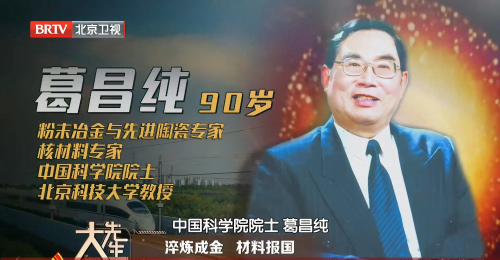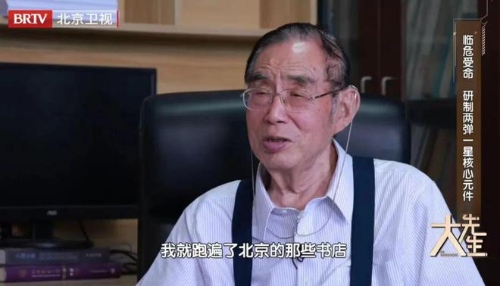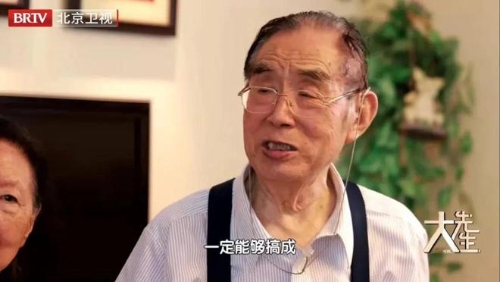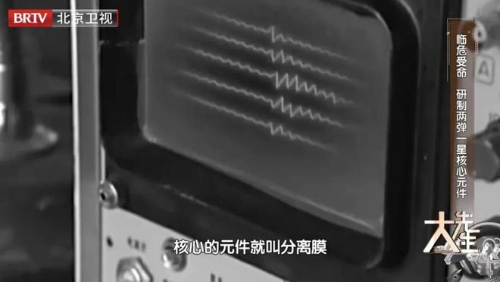Editor's Notes:
Season 3 of the educational science program "Mr. Science" has started to air on Beijing Radio and Television Station (BRTV) every Tuesday at 21:05 since July 30, 2024. Each episode features a prominent Chinese scientist who imparts wisdom and experiences to a group of university and middle school students known as the "Future Team," fostering an engaging learning environment. Here are the stories of these distinguished scientists.
Upon arriving at Ge Changchun's home, the first thing that catches the eye is a cabinet full of certificates—such as the "Academician of the Chinese Academy of Sciences" certificate, the "Lifetime Achievement Award in Metallurgical Science and Technology," and the "Meritorious Figure" medal—all of which are testaments to Ge's passion for scientific research and his unwavering pursuit of excellence.
In 1960, at just 26 years old, Ge was entrusted with a monumental task: leading a team of young scientists to develop critical materials for atomic and hydrogen bombs. This endeavor was vital for China’s “Two Bombs, One Satellite” project.
The production of the ethylene separation membrane, a key component in nuclear technology, was considered an international secret, known only to a few countries, including the Soviet Union, the US, and the UK. For a newly established country at the time, lacking both technology and experience, the path to nuclear capability was daunting.
Determined to achieve self-reliance, Ge and his team took on the challenge of developing the separation membrane after the departure of Soviet experts. They faced significant obstacles, including limited resources and a lack of prior experience. However, Ge's extraordinary perseverance shone through. He tirelessly scoured bookstores across Beijing for research materials and taught himself multiple languages, including Japanese, German, and French. This remarkable self-study not only broadened his knowledge but also opened doors to global scientific literature, enabling him to find innovative solutions to complex problems.
Through relentless effort, Ge and his team achieved a historic breakthrough in 1964 by successfully creating China’s first ethylene separation membrane. The following year, he was appointed as the chief director for its production, leading a team of over 600 researchers to complete the production goals within just two years. This accomplishment not only filled a critical gap in domestic technology but also laid a strong foundation for the future of China’s nuclear industry.
Ge’s passion for materials science is rooted in his desire to contribute to his country’s development. He understands that materials science is the cornerstone of a nation’s strength and a key indicator of its strategic competitiveness and innovation capabilities. Advanced ceramics, in particular, have become crucial in various high-tech fields. Recognizing the importance of this technology in the 1980s, Ge shifted his research focus to advanced ceramics, aiming to enhance China’s position in the global technology landscape.
In October 1980, Ge learned about an opportunity with the Humboldt Foundation in Germany, which was seeking researchers. Without hesitation, he embarked on a journey to further his studies, driven by the vision of establishing a world-class research institute in China. His time at the Powder Metallurgy Laboratory of the Max Planck Institute was transformative.
Upon his return, Ge faced numerous challenges in establishing a state-of-the-art laboratory for powder metallurgy and advanced ceramics. His efforts filled a significant gap in these technologies and nurtured a new generation of talented researchers who would contribute to China’s technological advancement.
One of the notable talents nurtured by Ge is Professor Yan Qingzhi. In 2010, shortly after completing her doctoral studies, she was entrusted with a critical mission: to develop domestically produced high-speed train brake pads.
High-speed rail, now a shining symbol of China's development, once faced a significant bottleneck issue for a long time: the brake pads were imported from Germany, creating a dependency that hindered China’s transportation development. Recognizing the detrimental impact of this situation, Ge understood the urgency of achieving domestic production. He entrusted Yan and her team with this vital responsibility.
This task was not only a technical challenge but also a significant test of China’s capacity for independent innovation. Thanks to their relentless efforts, Yan and her team successfully developed a high-speed train brake pad after three years of intensive research and over a thousand trials. The new brake pads not only matched international standards but also significantly reduced costs, breaking the foreign monopoly and providing a strong impetus for China’s high-speed rail development.
Ge Changchun's life and work embody the spirit of scientific inquiry and patriotism. His achievements serve as an enduring source of inspiration for future generations, encouraging them to pursue innovation and strive for excellence in technology. His legacy will continue to motivate others to push the boundaries of science and contribute to the progress of their nation.



